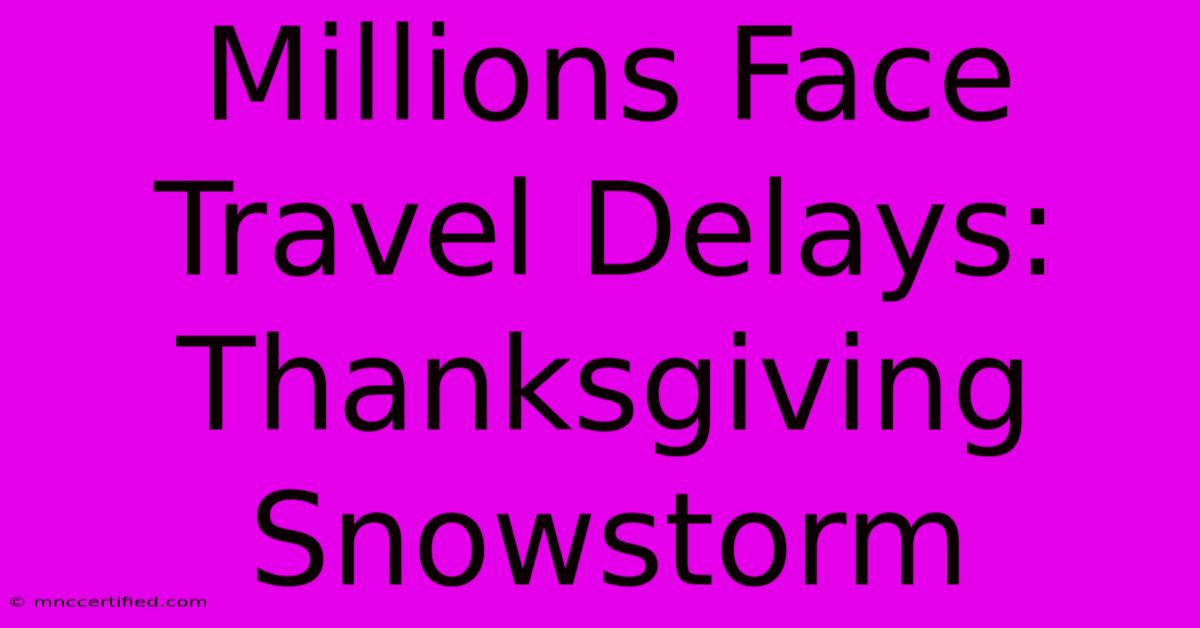Millions Face Travel Delays: Thanksgiving Snowstorm

Table of Contents
Millions Face Travel Delays: Thanksgiving Snowstorm Cripples Air and Road Travel
Millions of Americans faced significant travel disruptions this Thanksgiving as a powerful winter storm blanketed much of the country, bringing heavy snow, freezing rain, and high winds. The unprecedented weather event caused widespread flight cancellations, lengthy highway closures, and significant delays for travelers eager to reach their holiday destinations. This year's Thanksgiving travel nightmare serves as a stark reminder of the importance of thorough travel planning and preparedness during unpredictable weather conditions.
A Nation Frozen: The Extent of the Disruptions
The Thanksgiving snowstorm, a truly historic event, impacted a vast geographical area, stretching from the Midwest to the East Coast. Major airports across the region, including Chicago O'Hare, Denver International, and New York's JFK and LaGuardia, experienced hundreds of flight cancellations and delays. Airlines scrambled to re-accommodate stranded passengers, leading to long queues and frustrated travelers. The sheer number of affected flights created a ripple effect, impacting connecting flights and causing delays far beyond the initial storm's reach. The impact wasn't limited to the skies; major highways were rendered impassable due to snow accumulation and icy conditions, leaving thousands of motorists stranded.
The Impact on Air Travel
The scale of flight cancellations was staggering. Many airlines proactively cancelled flights in anticipation of the storm, while others were forced to ground planes due to severe weather conditions at their destinations. This led to a domino effect, impacting passengers who were already on their way to the airport or who had connecting flights. Passengers reported spending hours waiting in crowded airports, with limited information and dwindling resources. The situation highlighted the need for better communication and preparedness from airlines during severe weather events. Flight tracking websites became invaluable tools for travelers trying to monitor their flights and find alternative options.
Road Travel Chaos: Snow, Ice, and Gridlock
Driving conditions were treacherous in many areas. Heavy snowfall reduced visibility to near zero, while icy roads created hazardous driving conditions. Numerous accidents were reported, leading to further highway closures and adding to the travel delays. Many state transportation departments issued travel advisories, urging drivers to avoid unnecessary travel. For those who braved the roads, the journey became a test of patience and resilience. Road closures were common, forcing drivers to find alternate routes or to simply wait out the storm.
Preparing for Future Winter Travel: Lessons Learned
This Thanksgiving's travel nightmare offers valuable lessons for future winter travel. Thorough planning is crucial, including checking weather forecasts regularly, monitoring flight and road conditions, and having backup plans in place. Packing appropriately for cold weather is also essential, ensuring you have warm clothes, blankets, and emergency supplies. Staying informed through reliable news sources and official travel advisories is vital to making informed decisions and avoiding unnecessary risks. The experience also highlights the importance of flexible travel arrangements, such as booking refundable tickets or allowing extra time for travel.
Tips for Avoiding Future Travel Disruptions
- Check the weather forecast: Monitor weather forecasts consistently leading up to your trip.
- Book flexible travel arrangements: Consider refundable tickets and allow extra time.
- Pack for all weather conditions: Include warm clothes, blankets, and emergency supplies.
- Monitor flight/road conditions: Utilize flight tracking websites and state transportation updates.
- Have backup plans: Consider alternative transportation options or accommodations.
- Communicate with others: Keep family and friends informed of your travel plans.
This Thanksgiving storm served as a harsh reminder of the unpredictable nature of winter weather and the potential impact on travel. By learning from this experience and implementing proactive measures, travelers can better prepare themselves for future winter journeys and potentially avoid similar disruptions. Safe and responsible travel should always be the top priority.

Thank you for visiting our website wich cover about Millions Face Travel Delays: Thanksgiving Snowstorm. We hope the information provided has been useful to you. Feel free to contact us if you have any questions or need further assistance. See you next time and dont miss to bookmark.
Featured Posts
-
Ronaldos Brace Al Nassr Triumphs
Nov 26, 2024
-
Jon Benet Ramsey Murder Unresolved
Nov 26, 2024
-
New Nusantara Manuscript Database Soas And National Library
Nov 26, 2024
-
U Conns Final Maui Trip
Nov 26, 2024
-
Chao Garden In Sonic 3 Trailer
Nov 26, 2024